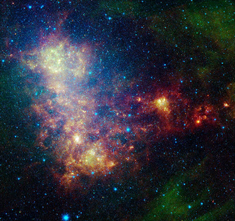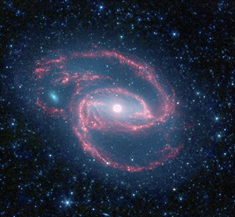Syllabus
Syllabus for printing - pdf
|
Section/Semester: |
Unique No. 49020, Spring 2010 |
|
Class Meetings: |
Tues & Thurs 11:00-12:15 AM, RLM 15.216B |
|
Instructor: |
Prof. Harriet Dinerstein |
|
Contact Info: |
(512) 471-3449, harriet@astro.as.utexas.edu |
|
Office Hours: |
RLM 16.324, M 1:30-2:30, W 10:30-11:30, or by appt |
|
Teaching Assistant: |
Mimi Song, Astronomy Graduate Student |
|
Contact Info: |
(512) 471-3447, mmsong@astro.as.utexas.edu |
|
Office Hours: |
RLM 16.220, M 2:30-3:30 |
|
Help Sessions: |
RLM 15.216B, W 5-6 PM (selected weeks) |
Main Course Website:
https://www.as.utexas.edu/astronomy/education/spring10/dinerstein/307.html
COURSE DESCRIPTION: Astronomy 307 is a one-semester introductory survey course on modern astronomy designed for science and engineering majors. Throughout the course, the instructor will assume that you are comfortable with solving problems using high-school level (non-calculus) math. If you don't feel that this describes you, please consider switching to Astronomy 301, the introductory course intended for non-science majors. There are several sections of Ast 301 being offered this semester, including one that meets at the same time as Astronomy 307.
Astronomy is a very broad subject to cover in a single semester, so we will move through the material at a rather rapid pace. My goal is to provide a comprehensive though brief overview of the Universe from our Solar System to the largest scales. If we are not able to cover your favorite topic in sufficient depth to fully satisfy your curiosity, you may wish to take one of the Astronomy Department's follow-up courses, the Ast 309 series, in a future semester. These cover a variety of different specialized topics, from The Solar System to Galaxies, Quasars, & the Universe.

Small Magellanic Cloud in IR
(Spitzer Space Telescope)
Caution: Don't purchase a book or eBook entitled "Universe: The Solar System" or "Universe: Stars and Galaxies." These versions omit major sections of the course material. Also, do not buy "Discovering the Universe" or "Discovering the Essential Universe," by Neil Comins (& possibly William Kaufmann); this is a different book entirely. (If in doubt, feel free to email the instructor, before wasting precious funds!).
APPROXIMATE SCHEDULE OF TOPICS AND READINGS:
|
Unit I: Observing the Sky |
ch. 1-6 |
1/19-2/11 |
|
Unit II: Solar System & Planets |
ch. 7, 8, & parts of 9-15 |
2/16-3/9 |
|
Unit III: The Sun and Stars |
ch. 16-22 |
3/23-4/8 |
|
Unit IV: Galaxies and the Universe |
ch. 23-26 |
4/13-5/4 |
IMPORTANT DATES FOR SPRING 2010 CLASSES:
|
First class day: Tues., Jan. 19 |
|
Last day of the official add/drop period: Fri., Jan. 22 |
|
12th Class Day (Last day to drop with a possible refund): Wed., Feb. 3 |
|
Last day to drop, except for documented non-academic reasons; also last day to change between letter-grade and pass/fail grading basis: Mon., Mar. 29 |
COURSE REQUIREMENTS AND GRADING POLICIES: My general philosophy regarding earning credit and determining your course grade is as follows:
Grades should be based on your individual performance, not on a "curve" driven by other students. For example, will be no quotas on A's or B's.
A significant portion of the grade will be based on sustained effort throughout the semester, such as on the regularly assigned homework, and on participation credits earned either in class or in certain pre-approved external activities.
The exams incorporate several different formats, including multiple-choice questions, short essays, and numerical problems. There will usually be some choice among the questions presented, for the latter two categories.
No individual make-up exams will be given for missed hour exams. Instead, I will offer two optional, more comprehensive exams, one at the middle and the other at the end of the semester, which will serve as make-up exams for the two halves of the semester respectively. These can also be taken voluntarily, as an opportunity to possibly raise your grade by replacing an earlier exam score.
GRADE ACCESS AND BASIS: You will be able to access your grades on specific assignments on your returned papers or via eGradebook, which will be updated frequently. The breakdown among different assignments will be as follows:
Hour Exams: 64%. There will be four regular in-class exams, each worth 16% of your grade. These will last less than the full class period (50 instead of 75 minutes). The format will be mixed, a combination of multiple choice, short essays, and numerical problems. Bring your own calculator; we will provide paper and a list of equations.
Most semesters, I use the official final exam time slot for an all-purpose makeup exam. By sheer (bad) luck, this semester our final exam time-slot is Sat., May 15, 7-10 PM. Although astronomers are used to working at night, I suspect that many of you will not find the concept of a Saturday evening final exam appealing. Therefore, I have decided to offer two make-up exams, one for each half of the semester. Each will serve as (the only) make-up exams for either of the hour exams in that half of the semester. Each exam, including each make-up exam, counts for 16% of the overall course grade.
|
Probable Dates for Regular Hour Exams (subject to change): February 11; March 4; April 8; and April 29 Probable Dates for Unit Make-up Exams: March 11 and May 6 |
Graded Homeworks: 20%. There will be 6 or 7 graded problem sets during the semester. The best 5 scores will count towards the homework total. You will have one week to complete each homework, with several opportunities to obtain help from the T.A. or instructor (see below). While you may discuss how to approach the homework with classmates and seek help if you need it, the work you turn in must be your own.
Lateness Policy for Homework: You are expected to turn in homework on time, which means at the beginning of class on the due date. If it is in the hands of the T.A. within the next 24 hours, it will receive reduced credit. Homeworks that are more than 24 hours late will not be accepted for grading. (Remember that you can drop one HW.)

NGC 1097 (Spitzer Space Telescope)
INSTRUCTOR POLICIES AND EXPECTATIONS: This course is designed under the assumption that students will attend regularly, and will stay engaged and up to date on the material being covered and the assignments for which they are responsible. We will be moving at a fairly rapid pace and will do our best to keep the class website current, but it is your responsibility to stay informed. Do "bookmark" the course website and consult it frequently for information, assignments, and feedback.
Classroom Protocol: While in class, I expect everyone to be respectful of the instructor and classmates. The classroom is not the place for social interactions or cell phone conversations. Please turn off the volume on your cell phone before the beginning of class. First time violators will be merely grimaced at, but subsequent cell-phone disruptions will adversely affect your grade. In addition, although some instructors allow students to use laptops in class, I find it distracting, so it will not be allowed.
Scholastic Integrity/Academic Dishonesty: The University of Texas at Austin has a generally stated, not very specific, honor code. More detailed and useful information is provided at http://deanofstudents.utexas.edu/sjs/index.php; see especially the links to "The Standard of Academic Integrity" and "Scholastic Dishonesty." The College of Natural Sciences takes these rules seriously. We will not tolerate copying or cheating on exams, homeworks, or other classwork. If we find duplicated work or other evidence of cheating, neither student involved will receive credit. We may also impose more severe academic penalties, depending on the circumstances, not excluding an F for the course, or a report of academic dishonesty to the Dean of Students.
GETTING HELP: The Instructor and T.A. will hold office hours each week. Please try to make use of these designated times, if at all possible, since both of us have other responsibilities and will not necessarily be available at other times. However, if you cannot attend the official office hours, please contact us to set up an alternate appointment time. The T.A. will hold help sessions the afternoon before homework is due and before each exam. You can also send questions by email. However, please check the class website first, to see whether the answer is already provided there.
STUDENTS WITH DISABILITIES: Upon request, the University of Texas at Austin provides appropriate academic adjustments for qualified students with disabilities. Contact the Office of the Dean of Students at 471-6259, or (TTY) 471-4641, or via email to ssd@uts.cc.utexas.edu or see http://deanofstudents.utexas.edu/ssd/.
SPECIAL EVENTS: The Astronomy Department offers evening Star Parties on campus on most Wednesdays, Fridays, and Saturdays; details will be announced and posted at http://outreach.as.utexas.edu/public/viewing.html. You will be allowed to earn up to two participation credits by attending star parties (one credit per event). In order to earn credit, however, you must get a signed slip from the person in charge of the star party. Warning to the naive: Star parties are held only when the weather permits. They are cancelled when it's too cloudy to see anything, so don't assume that you can wait until the end of the semester. If it's cloudy then, you will be out of luck!
There will be one or more public talks relevant to Ast 307 during this semester, which you may attend for participation credit. One such talk is coming up in early February (details to be announced). In order to earn participation credit for attending a public talk, you will need to submit a brief write-up summarizing in your own words what you heard and learned; the amount of credit earned will be determined from your write-up. The write-up must be submitted to the instructor as hard copy (not emailed).